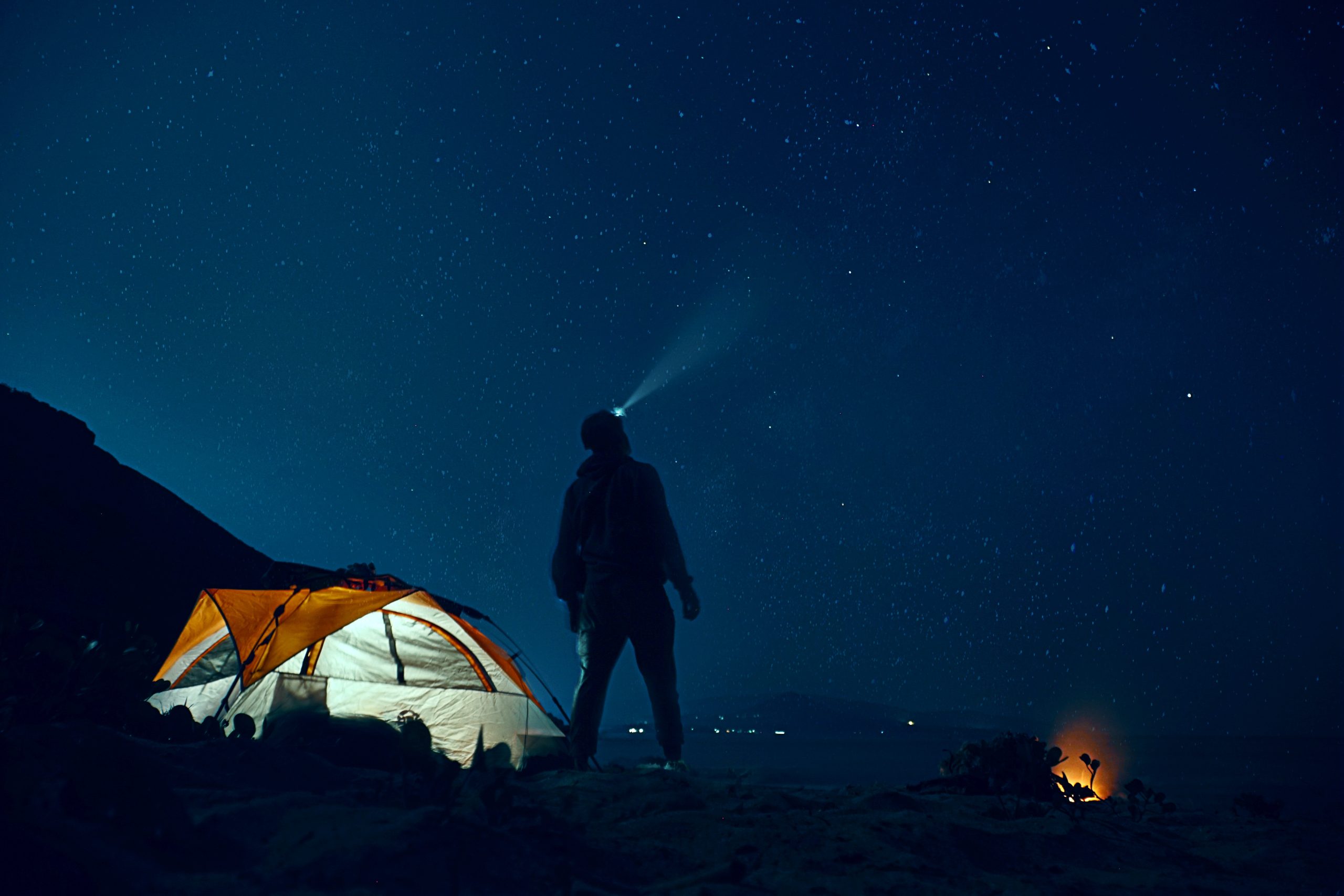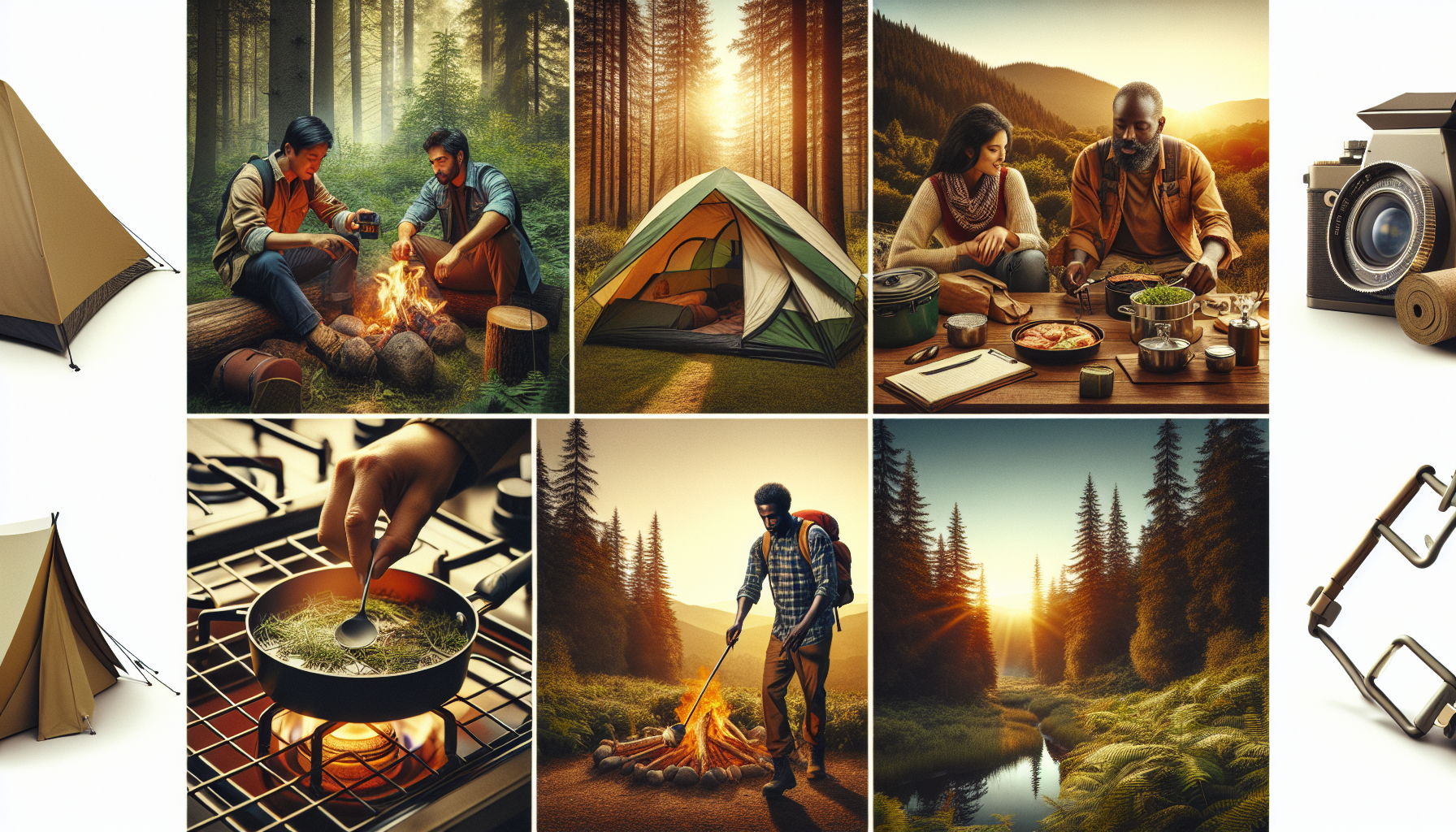Are you an outdoor enthusiast but feel clueless when it comes to camping? If so, don’t worry! In this article, you’ll discover a simple yet comprehensive guide on learning the basics of camping skills. Whether you’re a first-time camper or just looking to brush up on your knowledge, we’ve got you covered. From setting up a tent to building a campfire, this article will equip you with the essential skills needed to embark on your next camping adventure with confidence. So get ready to embrace the great outdoors and unlock the joys of camping!

Choosing the Right Camping Gear
Understanding Basic Camping Needs
When it comes to camping, it’s important to have a clear understanding of the basic needs you’ll have while spending time in the great outdoors. These needs typically include shelter, sleep, food, clothing, navigation, first aid, and safety. By considering each of these needs, you can ensure that you have all the necessary gear to make your camping experience a comfortable and enjoyable one.
Selecting a Suitable Tent
One of the most essential pieces of camping gear is a suitable tent. When selecting a tent, it’s important to consider factors such as its size, weight, ease of setup, and durability. A tent with proper ventilation is also crucial to ensure a comfortable and condensation-free sleep. Taking into account the number of occupants and the weather conditions you’ll be camping in will help you choose the right tent that meets your specific needs.
Choosing Sleeping Bags and Pads
A good night’s sleep is vital for a successful camping trip, and choosing the right sleeping bag and sleeping pad is key to achieving this. When selecting a sleeping bag, consider the temperature rating to ensure you stay warm in colder weather. Additionally, selecting a sleeping pad that provides sufficient insulation and comfort will greatly enhance your sleeping experience in the outdoors.
Cooking Equipment Essentials
No camping trip would be complete without some delicious meals cooked over an open fire or portable stove. When it comes to cooking equipment, essentials include a camp stove or grill, cookware such as pots and pans, utensils, and a cooler or food storage containers. Opt for lightweight and portable options that are easy to clean and store.
Clothing for Different Weather Conditions
Weather conditions can change rapidly while camping, so it’s important to be prepared with appropriate clothing. Packing versatile and layerable clothing is key, as it allows you to adjust your attire based on the temperature and weather conditions. Don’t forget essentials such as rain gear, warm layers, and extra socks to keep you comfortable and protected in any weather.
Navigating Backpack Options
If you’re planning on hiking or backpacking, having a suitable and well-fitting backpack is essential. When choosing a backpack, consider factors such as capacity, weight, comfort, and organization features. A properly fitting backpack will distribute the weight evenly and make your hiking experience much more enjoyable.
The Importance of a First Aid Kit
Accidents happen, even in the great outdoors. Having a well-stocked first aid kit is crucial to your safety while camping. Your first aid kit should include essentials such as adhesive bandages, antiseptic wipes, pain relievers, a first aid manual, and any necessary prescription medications. It’s important to regularly check and restock your first aid kit before each camping trip.
Setting Up Camp
Finding the Perfect Campsite
Finding the perfect campsite is an important part of setting up camp. Look for a flat and level area that is away from hazards such as dead trees, loose rocks, and low-lying areas that could flood in case of rain. Consider the proximity to water sources, such as rivers or lakes, and the availability of shade and privacy. Additionally, follow any designated camping regulations and permits to ensure you’re camping in permitted areas.
Tent Pitching Techniques
Once you’ve found the perfect campsite, it’s time to pitch your tent. Familiarize yourself with the specific instructions for your tent model, as different tents may have different pitching techniques. Ensure that your tent is securely staked to the ground and that all the poles are properly set up. This will prevent any unexpected surprises during the night and ensure a stable and comfortable shelter.
Organizing Your Campsite
Keeping your campsite organized is essential for a stress-free camping experience. Set up designated areas for different activities such as cooking, sleeping, and relaxing. Keep your gear neatly stored and easily accessible. It’s also important to properly dispose of any waste, separate recyclables, and follow leave no trace principles to minimize your environmental impact.
Leave No Trace Principles
Leave no trace is an essential principle in responsible camping. This means leaving the campsite exactly as you found it, without leaving any garbage or traces of your presence. Follow principles such as disposing of waste properly, minimizing campfire impact, respecting wildlife, and leaving natural and cultural artifacts untouched. By practicing leave no trace ethics, you can ensure that future campers can also enjoy the beauty of the outdoors.
Campfire Building and Safety
Gathering and Preparing Firewood
Building a campfire not only provides warmth and light but also adds to the overall camping experience. Before starting a fire, gather firewood from a designated area or use firewood you’ve brought with you. It’s important to only use dead and fallen wood, as live trees and branches are essential for the ecosystem. Ensure that the wood is dry and properly prepared to promote efficient burning and minimize smoke.
Techniques for Starting a Fire
Starting a fire can sometimes be a challenging task, but with some basic techniques, you’ll be able to ignite a roaring campfire. Popular methods include using matches, lighters, or fire starters. It’s important to have proper fire-starting equipment on hand and to choose a safe location for your fire. Following safety guidelines, such as having a fire ring or rock ring to contain the flames, will help prevent any accidents and keep you and your surroundings safe.
Fire Safety Guidelines
Safety should always be a top priority when it comes to campfires. When enjoying a campfire, make sure to keep a safe distance from the flames and never leave the fire unattended. Always have a bucket of water or a fire extinguisher nearby to quickly extinguish any unexpected flare-ups. Additionally, be aware of any fire restrictions in the area and follow them accordingly to prevent wildfires.
Extinguishing Your Campfire Properly
Before leaving your campsite or going to bed, it’s crucial to properly extinguish your campfire. Start by allowing the wood to burn down to ash and then use water to thoroughly douse the fire. Stir the ashes and water together to ensure complete extinguishment. It’s important to remember that even a small ember can reignite a fire, so confirm that the fire is completely out and cool to the touch before leaving your campfire unattended.
Outdoor Cooking Basics
Simple Camp Cooking Techniques
Outdoor cooking can be a fun and delicious part of the camping experience. Whether you’re cooking over an open fire or using a camp stove, there are plenty of simple techniques to master. Some popular methods include grilling, boiling, frying, and foil packet cooking. Plan and prepare your meals ahead of time, and don’t forget to pack essential cooking utensils and ingredients for a satisfying outdoor dining experience.
Using a Portable Stove or Grill
A portable stove or grill can make outdoor cooking a breeze. These compact and lightweight devices are ideal for camping as they are easy to transport and provide a reliable heat source. When using a portable stove or grill, always follow the manufacturer’s instructions and ensure proper ventilation to avoid any accidents or gas build-up.
Meal Planning and Food Storage Tips
Effective meal planning and proper food storage are essential for a successful camping trip. Plan your meals ahead of time and consider factors such as the number of people, available cooking equipment, and perishability of food items. Pack your food in secure containers or coolers to prevent spoilage and cross-contamination. Remember to properly dispose of any food waste and follow leave no trace principles to minimize your impact on the environment.
Leave No Trace Cooking and Cleaning
Leave no trace principles apply not only to waste disposal but also to cooking and cleaning. When preparing meals, use biodegradable and eco-friendly cleaning supplies to minimize the impact on nature. Dispose of any cooking water away from water sources, and properly clean and sanitize any cooking utensils and dishes. By practicing leave no trace cooking and cleaning, you can enjoy delicious meals while minimizing your environmental footprint.

Hydration and Water Treatment
Sources of Water in the Wild
Finding a safe and reliable water source is essential for camping. Natural sources such as rivers, lakes, and streams may seem tempting, but it’s important to treat the water before consumption. Alternatively, you can bring your own water from a trusted source, ensuring you have an adequate supply for the duration of your camping trip.
Purification Methods for Drinking Water
Before consuming any water from natural sources, it’s crucial to properly purify and treat it. This helps eliminate harmful bacteria, parasites, and viruses that could cause illness. Common purification methods include boiling, using water filters or purifiers, and chemical treatments such as iodine or chlorine tablets. Research and choose a water treatment method that suits your needs and the specific environment you’ll be camping in.
Staying Hydrated While Camping
Staying hydrated is vital while camping, especially when engaging in outdoor activities. Always carry a sufficient amount of water with you, and regularly drink even if you don’t feel thirsty. Consider using hydration packs or carrying reusable water bottles to easily access and drink water throughout the day. Additionally, be aware of the signs of dehydration and take necessary precautions to prevent it.
Hiking and Navigation Skills
Understanding Hiking Basics
Hiking is a great way to explore the outdoors and experience the beauty of nature. Before embarking on a hiking adventure, it’s important to understand the basics of hiking. This includes knowing how to choose appropriate footwear, dressing in layers, bringing essential gear such as a map and compass, and being aware of your physical capabilities. Consider the difficulty level of the trail and plan your hike accordingly to ensure a safe and enjoyable experience.
Map Reading and Compass Use
Having basic navigation skills is crucial for hiking in unfamiliar territory. Familiarize yourself with the fundamentals of reading maps and using a compass. Learn how to identify different types of terrain, follow trails, and locate landmarks. By honing your map reading and compass skills, you’ll be able to confidently navigate through various terrains and ensure you’re on the right path.
Using GPS and Other Electronic Devices
In addition to traditional navigation methods, GPS devices and other electronic devices can play a valuable role in hiking and navigation. GPS devices can provide accurate location information and track your progress along the trail. Smartphones with navigation apps and offline maps can also be useful tools. However, it’s important to remember that electronic devices can fail or run out of battery, so always have a backup plan and rely on your skills and traditional navigation methods.
Marking Trails and Not Getting Lost
To ensure your safety and the safety of others, it’s important to practice proper trail marking techniques and avoid getting lost. Learn how to read trail markers and signage, and always follow established trails. If you need to mark a trail for personal use, use temporary and environmentally friendly markers such as ribbon or flagging tape. Staying on marked trails helps minimize environmental impact and ensures that future hikers can enjoy the same route.

Wildlife Encounters and Safety
Identifying Local Wildlife
Encountering wildlife while camping can be an exciting experience, but it’s important to do so safely and responsibly. Take the time to educate yourself about the local wildlife species in the area you’ll be camping. Learn to identify animals, birds, and insects to understand their behaviors and potential risks. Knowing how to differentiate between harmless and potentially dangerous wildlife will help you make informed decisions and avoid unnecessary encounters.
Safe Interaction with Animals
Respecting wildlife and practicing safe interaction is crucial to both your safety and the well-being of the animals. Keep a safe distance and never approach or feed wild animals. Store food properly to prevent attracting animals to your campsite, and dispose of garbage in designated bear-proof containers or secure it in your vehicle. By respecting wildlife and their habitats, you can observe them in a responsible and ethical manner.
Storing Food to Prevent Animal Intrusions
Properly storing food and other scented items is essential to prevent animals from invading your campsite. Use bear-resistant containers or hang your food in a bear bag, following the guidelines provided by the park or wilderness area you’re camping in. Keep your campsite clean and free of any food debris or scented items that may attract unwanted visitors. By taking these precautions, you can minimize the risk of encountering animals in your campsite.
What to Do If You Encounter a Predatory Animal
While it’s rare to encounter predatory animals, knowing what to do in such situations is important for your safety. If you encounter a predatory animal such as a bear or cougar, it’s crucial to remain calm and avoid direct eye contact. Make yourself appear larger by raising your arms and speaking in a firm, calm voice. Slowly back away, showing the animal that you’re not a threat. Never run, as it may trigger the animal’s chase instinct. If the animal charges, use bear spray as a last resort to deter and protect yourself.
Weather Preparedness
Understanding Weather Patterns
Being aware of weather patterns is crucial for camping safety and comfort. Learn about the typical weather conditions in the area you’ll be camping, including temperature ranges, precipitation, and the likelihood of severe weather events. Stay updated with weather forecasts before and during your trip, and be prepared to adjust your plans accordingly.
Preparing for Extreme Weather Conditions
In the outdoors, weather conditions can change rapidly, and it’s essential to be prepared for extreme weather events. Pack appropriate clothing and gear for different weather conditions, including rain gear, warm layers, and sun protection. Additionally, be aware of any potential risks such as lightning storms, high winds, or flash floods. Have a plan in case of severe weather and be ready to seek shelter if necessary.
Adjusting Your Activities to Weather Changes
Flexibility is key when it comes to camping and outdoor activities. If the weather takes a turn, be prepared to adjust your plans accordingly. Have backup activities in mind, such as exploring nearby indoor attractions, visiting museums, or engaging in low-risk outdoor activities. Remember that safety should always come first, and it’s better to postpone or modify your plans to ensure a safe and enjoyable camping experience.
Emergency Signaling and Sheltering
In the event of an emergency or unexpected weather event, it’s important to know how to signal for help and seek shelter. Carry essential survival gear such as whistles, signal mirrors, and waterproof fire starters. Learn distress signals and emergency protocols for the specific area you’ll be camping. Understanding how to seek proper shelter, whether it’s a sturdy tent, natural formations, or emergency structures, will greatly increase your chances of staying safe during adverse weather conditions.

Leave No Trace Ethics
Seven Principles of Leave No Trace
Leave no trace ethics are guidelines that promote responsible and sustainable outdoor practices. The seven principles of leave no trace are as follows:
- Plan ahead and prepare: Proper planning minimizes environmental impact and ensures a safe and enjoyable experience.
- Travel and camp on durable surfaces: Stick to established trails and campsites to prevent vegetation damage and soil erosion.
- Dispose of waste properly: Pack out all trash and leave no litter behind. Dig catholes for human waste, at least 200 feet from water sources.
- Leave what you find: Preserve nature by not disturbing or taking natural and cultural artifacts.
- Minimize campfire impact: Follow fire guidelines, use established fire rings or pits, and minimize the use of firewood to prevent resource depletion.
- Respect wildlife: Observe wildlife from a safe distance and do not feed or approach them. Minimize your impact on their natural habitats.
- Be considerate of other visitors: Respect other campers’ privacy and space. Keep noise levels to a minimum and be mindful of the impact you may have on their experience.
Minimizing Campfire Impact
Campfires are an enjoyable part of camping, but their impact should be minimized. Choose pre-existing fire rings or pits whenever possible and refrain from building new fire pits. Only use dead and fallen wood for fuel to avoid damaging live trees and vegetation. Ensure that the fire is fully extinguished before leaving the campsite.
Respect Wildlife and Nature
Respecting wildlife and their natural habitats is essential for preserving the natural balance of ecosystems. Observe wildlife from a distance, never feed or approach them, and never attempt to touch or handle wild animals. Respect their natural behavior and keep human interactions to a minimum. It’s also crucial to avoid damaging plants, trees, and other natural features of the environment.
Camping with Minimal Environmental Footprint
Camping with a minimal environmental footprint means being conscious of the waste we generate and the impact we have on the environment. Minimize single-use items and pack reusable alternatives whenever possible. Properly dispose of waste, separate recyclables, and leave the campsite free of any traces of your presence. By practicing these principles, you can enjoy the beauty of nature while ensuring it remains pristine for future generations.
Environmental Responsibility and Education
Understanding Environmental Impact
Understanding the environmental impact of camping and outdoor activities is crucial for practicing responsible outdoor recreation. Familiarize yourself with the potential effects of waste disposal, habitat disruption, and pollution on ecosystems. By being aware of the impact we have on the environment, we can make informed decisions and take actions to reduce our ecological footprint.
Educational Resources for Sustainable Camping
Educational resources are available to help individuals learn about sustainable camping practices. Explore websites, books, and documentaries that focus on outdoor ethics, conservation, and sustainable camping techniques. Many parks, wilderness areas, and environmental organizations also offer educational programs and workshops to promote responsible camping and environmental stewardship.
Participating in Conservation Efforts
Camping provides an opportunity to connect with nature and contribute to its preservation. Consider participating in conservation efforts such as park clean-up events, trail maintenance projects, or wildlife monitoring programs. By actively engaging in conservation activities, you can directly contribute to the protection and preservation of natural areas.
Encouraging Others to Camp Responsibly
Promoting responsible camping and environmental stewardship is not only important for your own actions but also for encouraging others to follow suit. Share your knowledge and experiences with friends, family, and fellow outdoor enthusiasts. Engage in conversations about sustainable camping practices and the importance of leaving a minimal environmental footprint. By spreading the message of responsible camping, you can inspire others to do their part in preserving the beauty of the outdoors.





